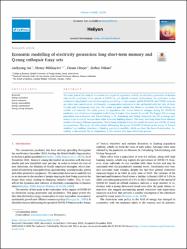| dc.contributor.author | An, Jaehyung | |
| dc.contributor.author | Mikhaylov, Alexey | |
| dc.contributor.author | Dinçer, Hasan | |
| dc.contributor.author | Yüksel, Serhat | |
| dc.date.accessioned | 2022-12-23T11:17:20Z | |
| dc.date.available | 2022-12-23T11:17:20Z | |
| dc.date.issued | 2022 | en_US |
| dc.identifier.citation | An, J., Mikhaylov, A., Dinçer, H., ve Yüksel, S. (2022). Economic modelling of electricity generation: long short-term memory and Q-rung orthopair fuzzy sets. Heliyon, 8(12). https://doi.org/10.1016/j.heliyon.2022.e12345 | en_US |
| dc.identifier.issn | 2405-8440 | |
| dc.identifier.uri | https://doi.org/10.1016/j.heliyon.2022.e12345 | |
| dc.identifier.uri | https://hdl.handle.net/20.500.12511/10175 | |
| dc.description.abstract | The main goal of this study is to evaluate the impact of population mobility on electricity generation in Russian cities in the conditions of the spread of COVID-19, and identify hotspots. Furthermore, the evaluation is also conducted using hybrid fuzzy decision-making modelling. In this context, q-ROF DEMATEL and TOPSIS methods are taken into consideration. Additionally, a comparative evaluation is also performed with the help of Intuitionistic and Pythagorean fuzzy sets. The results are quite similar that allows to conclude that the findings are reliable and coherent. The study proves the hypothesis that human behavior changed during the COVID-19 pandemic, and electricity consumption is declining in major cities around the world. The biggest fall in energy generation was in Moscow and Yekaterinburg. In St. Petersburg and Nizhny Novgorod, the fall in energy generation is no so crucial because these cities have low building density. The study uses Long Short-Term Memory models with many different parameters. The Q-Rung Orthopair Fuzzy Sets model forecasts new COVID-19 using ten parameters. This study identifies factors influencing the spread of COVID-19 based on the theory of “broken windows” and outlines directions in limiting population mobility, which can form the basis of state policy. According to the analysis the air temperature is the variable that most affects this process. | en_US |
| dc.language.iso | eng | en_US |
| dc.publisher | Elsevier Ltd | en_US |
| dc.rights | info:eu-repo/semantics/openAccess | en_US |
| dc.rights | Attribution-NonCommercial-NoDerivatives 4.0 International | * |
| dc.rights.uri | https://creativecommons.org/licenses/by-nc-nd/4.0/ | * |
| dc.subject | Energy Economics | en_US |
| dc.subject | Energy Optimization | en_US |
| dc.subject | Energy Saving Strategies | en_US |
| dc.subject | Energy Sustainability | en_US |
| dc.subject | Power Resources | en_US |
| dc.title | Economic modelling of electricity generation: long short-term memory and Q-rung orthopair fuzzy sets | en_US |
| dc.type | article | en_US |
| dc.relation.ispartof | Heliyon | en_US |
| dc.department | İstanbul Medipol Üniversitesi, İşletme ve Yönetim Bilimleri Fakültesi, Uluslararası Ticaret ve Finansman Bölümü | en_US |
| dc.authorid | 0000-0002-8072-031X | en_US |
| dc.authorid | 0000-0002-9858-1266 | en_US |
| dc.identifier.volume | 8 | en_US |
| dc.identifier.issue | 12 | en_US |
| dc.relation.publicationcategory | Makale - Uluslararası Hakemli Dergi - Kurum Öğretim Elemanı | en_US |
| dc.identifier.doi | 10.1016/j.heliyon.2022.e12345 | en_US |
| dc.institutionauthor | Dinçer, Hasan | |
| dc.institutionauthor | Yüksel, Serhat | |
| dc.identifier.wosquality | Q2 | en_US |
| dc.identifier.wos | 000904170900004 | en_US |
| dc.identifier.scopus | 2-s2.0-85143976735 | en_US |
| dc.identifier.pmid | 36578428 | en_US |
| dc.identifier.scopusquality | Q1 | en_US |



















